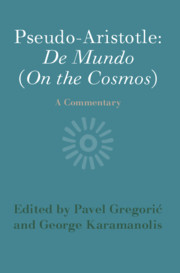Book contents
- Pseudo-Aristotle: De mundo (On the Cosmos)
- Pseudo-Aristotle: De mundo (On the Cosmos)
- Copyright page
- Contents
- Figures
- Contributors
- Preface
- Abbreviations
- Chapter 1 Introduction
- Chapter 2 On Philosophy and Its Proper Subject (Chapter 1)
- Chapter 3 The Heavenly Sphere (Chapter 2, 391b9–392a31)
- Chapter 4 The Sublunary Domain (Chapters 2–3, 392a31–393a8)
- Chapter 5 Geography (Chapter 3, 393a9–394a6)
- Chapter 6 Meteorology (Chapter 4)
- Chapter 7 The Eternity of the Cosmos (Chapter 5)
- Chapter 8 God’s Relation to the Cosmos (Chapter 6)
- Chapter 9 God’s Many Names (Chapter 7)
- Bibliography
- Index
Chapter 9 - God’s Many Names (Chapter 7)
Published online by Cambridge University Press: 10 December 2020
- Pseudo-Aristotle: De mundo (On the Cosmos)
- Pseudo-Aristotle: De mundo (On the Cosmos)
- Copyright page
- Contents
- Figures
- Contributors
- Preface
- Abbreviations
- Chapter 1 Introduction
- Chapter 2 On Philosophy and Its Proper Subject (Chapter 1)
- Chapter 3 The Heavenly Sphere (Chapter 2, 391b9–392a31)
- Chapter 4 The Sublunary Domain (Chapters 2–3, 392a31–393a8)
- Chapter 5 Geography (Chapter 3, 393a9–394a6)
- Chapter 6 Meteorology (Chapter 4)
- Chapter 7 The Eternity of the Cosmos (Chapter 5)
- Chapter 8 God’s Relation to the Cosmos (Chapter 6)
- Chapter 9 God’s Many Names (Chapter 7)
- Bibliography
- Index
Summary
In the seventh and last chapter of De mundo, the author discusses the many names of God, which reflect the various effects God produces in the world (401a12–27). In line with the predominantly Aristotelian background of the author, it is claimed that these effects are not caused by God directly, but by his power (dunamis). This approach helps explain various traditional names, epithets and functions assigned to Zeus in Greek religion and mythology, including names which refer to meteorological phenomena and epithets related to cosmology, but also, perhaps more surprisingly, to human affairs. In this respect, as a detailed comparison shows, the chapter is clearly inspired by various Stoic authors. The central place of the chapter is occupied by the famous Orphic hymn to Zeus. A detailed interpretation of the hymn shows that it is in many ways compatible with the philosophical outlook of De mundo. However, the hymn also features parallels with the Orphic theogony commented upon in the Derveni Papyrus and its later version, which was quoted by late Neoplatonists. The comparison reveals various similarities and differences between these three texts and supports a hypothesis according to which the author of De mundo omitted some parts of the original Orphic theogony. Traces of the missing verses, however, can be seen in the subsequent section (401b8–29), where Fate is discussed. This interconnection helps us to better understand both De mundo and the Derveni Papyrus.
- Type
- Chapter
- Information
- Pseudo-Aristotle: De Mundo (On the Cosmos)A Commentary, pp. 213 - 230Publisher: Cambridge University PressPrint publication year: 2020

